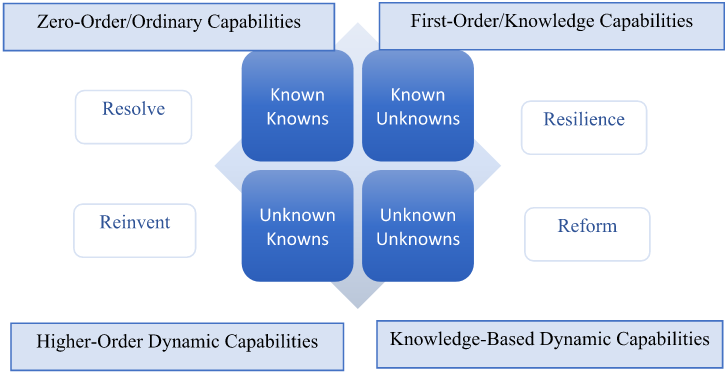California Management Review
California Management Review is a premier academic management journal published at UC Berkeley
by Vaneet Kaur

“There are known knowns. These are things we know that we know. There are known unknowns. That is to say, there are things that we know we don’t know. But there are also unknown unknowns. There are things we don’t know we don’t know.”
-Donald Rumsfeld, Secretary of Defense at Press Briefing, 2002
At the time of war like situation, businesses must take a leaf out of war work and accede to a reverberating war wisdom. For that reason, this tongue-twisting utterance can be twiddled to a T for inking a labyrinth map that is to the point, for taking point, in the war zone de nos jours. At this eon of quandary galore, organizations can strategically position themselves on war footing by going great guns through the propounded known-unknown quadrants.
There are four types of uncertainties that businesses can be forced to contend with, starting from a known and identified territory to an unknown and unidentified risk milieu. Coronavirus outbreak indubitably qualifies for being in the orbit of apogee, nevertheless, paralysis can still not be an option. In fact, acting now, amid crisis, will prove to be momentous.
The key to success lies in climbing up the ladder of hierarchy of organizational capabilities until the point of superlative Knowledge-Based Dynamic Capabilities is reached, thereby equipping an organization with instantaneous responsiveness to maximal environmental dynamism.
Figure 1: Proposed Framework

Known Knowns – When a crisis occurs, an organization can operate at the capacity that it is aware of as well as understands. At these initial stages of firefighting, companies must test their current credos to resolve emerging problems. This can be done by deploying Zero-Order or Ordinary Capabilities that enable an organization to continue undertaking day to day operations, at a pre-existing scale, in order to support existing products and services.
Known Unknowns – After the initial resolve phase, organizations must demonstrate resilience and strive to gain enlightenment on the things that it is aware of but does not understand. This can be achieved by building Knowledge Management Process Capabilities which enable an organization to leverage knowledge in a series of synchronized processes to achieve organizational goals. For example: Tencent set up a WeChat function to collect tipoffs and suggestions from the general public in order to prevent misinformation and improve efficiencies.
Unknown Knowns – After returning to normalcy, organizations must work towards reinventing themselves. This phase entails working on things that a company has understood by the virtue of developing knowledge capabilities but is not aware about their commercialization. Higher-Order Dynamic Capabilities can assist firms in utilizing their idiosyncratic combinations of resources to modify, integrate and renew existing resources. These capabilities can take various forms like Adaptive Capability, Absorptive Capability, and Innovative Capability. For instance, WeChat added a new health segment to its Wallet sub-menu that includes the ability to track real-time epidemic data.
Unknown Unknowns – A company can reform itself by building such capabilities that assist it in knowing such things it is neither aware of nor understands. The road to this vertex of vigilance is formed of meta capabilities that hold the potential to pivot organizations out of Corona Chaos. Knowledge-Based Dynamic Capabilities are a blend of Knowledge Management Process Capabilities and Higher-Order Dynamic Capabilities and are formed by underpinning Higher-Order Capabilities with Knowledge Capabilities. For example, Takeda, a biopharmaceutical company, acquired knowledge about the possibility of plasma-derived therapy as a cure for COVID-19 and collaborated with other leading organizations and agencies to combine expertise. After having developed these knowledge resources, company is absorbing them to adapt as well as come up with a ground-breaking innovation.
Organizations at the bleeding edge of Corona chaos must make headway from the known risk environment towards the chasmic uncertainty of unknown unknowns. Familiar environs can be sailed through with ordinary capabilities, however, for helming unfathomable uncertainties, an organization requires a synergistic toolkit customized by coalescing Knowledge Capabilities with Higher-Order Capabilities to form Knowledge-Based Dynamic Capabilities. Vigilant organizations that proactively develop such meta-level capabilities are poised to triumphantly traverse the knowns and unknowns of Corona chaos and emerge stronger from this crisis.